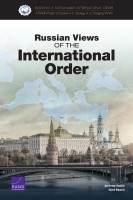| 来源类型 | Research Reports
|
| 规范类型 | 报告
|
| DOI | https://doi.org/10.7249/RR1826
|
| ISBN | 9780833097279
|
| 来源ID | RR-1826-OSD
|
| Russian Views of the International Order |
| Andrew Radin; Clinton Bruce Reach
|
| 发表日期 | 2017
|
| 出版年 | 2017
|
| 页码 | 124
|
| 语种 | 英语
|
| 结论 |
Russia's Core Interests and Views of the International Order- Russia's five core interests include defense of the country and the regime, influence in the near abroad, a vision of Russia as a great power, noninterference in domestic affairs, and political and economic cooperation as an equal to other great powers.
- After pursuing closer relations with the West after the Cold War, Russia has become more skeptical and suspicious of the West. From a Russian perspective, the West has refused to recognize Russia's basic interests, and several Western activities, such as support for color revolutions and EU and NATO expansion, threaten Russia's security.
- Russia seeks to strengthen the international order where it perceives the order as benefiting Russia's core interests, as in the United Nations system and certain international economic institutions. In other areas, where Russia perceives the international order as threatening, it has actively sought to undermine the existing order.
Major Points of Contestation Between the United States and Russia- The most fundamental point of contestation between the United States and Russia on the international order is the status of Belarus, Georgia, Moldova, and Ukraine — all former Soviet republics. Russia views these countries as part of its exclusive sphere of influence, while the United States views these as free, sovereign countries that have the right to join Western institutions.
- U.S. policy toward democracy promotion, foreign intervention, and the free flow of information directly conflict with Russian views and could lead to contestation or conflict.
|
| 摘要 |
- Russian and U.S. interests are not always opposed. By recognizing that Russian views of the current international order vary across elements of the order, it becomes possible to identify points of potential cooperation and likely contestation. Where there are shared interests — including avoiding major war, improving economic cooperation, and combating terrorism — cooperation is feasible and potentially desirable.
- In areas where there is contestation, the desired U.S. approach to Russia with respect to the international order critically depends on two factors: (1) the importance of enabling former Soviet republics to freely join Western institutions and (2) whether Russia will limit its aggression in Europe if its interests are recognized.
- If one does not believe that Western institutions should necessarily be open to former Soviet countries or that Russia would undertake aggression if the West ceased to be active in the former Soviet countries, it would make sense to adapt the U.S. approach to order to recognize Russia's sphere of influence.
- However, if one believes that the former Soviet countries should be free to join Western institutions and that Russia has the potential to expand its influence and undertake aggression, it would make sense to double down on the existing approach to order while bolstering U.S. support for its partners.
- U.S. policy toward the European political and security order will likely involve some elements of both recognizing Russian interests and strengthening the existing international order in Europe.
|
| 主题 | European Union
; Global Security
; International Diplomacy
; North Atlantic Treaty Organization
; Politics and Government
; Russia
; United Nations
; United States
|
| URL | https://www.rand.org/pubs/research_reports/RR1826.html
|
| 来源智库 | RAND Corporation (United States)
|
| 引用统计 |
|
| 资源类型 | 智库出版物
|
| 条目标识符 | http://119.78.100.153/handle/2XGU8XDN/108663
|
推荐引用方式
GB/T 7714 |
Andrew Radin,Clinton Bruce Reach. Russian Views of the International Order. 2017.
|
|
文件名:
|
x1535054546952.jpg
|
|
格式:
|
JPEG
|

|
文件名:
|
RAND_RR1826.pdf
|
|
格式:
|
Adobe PDF
|
除非特别说明,本系统中所有内容都受版权保护,并保留所有权利。